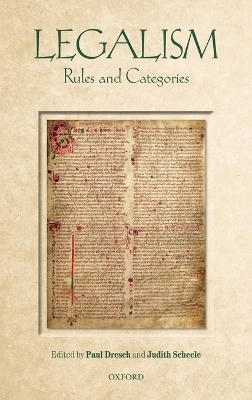
Legalism
Oxford University Press (Verlag)
978-0-19-875381-0 (ISBN)
Mainstream historians in recent decades have often treated formal categories and rules as something to be 'used' by individuals, as one might use a stick or stone, and the gains of an earlier legal history are often needlessly set aside. Anthropologists, meanwhile, have treated rules as analytic errors and categories as an imposition by outside powers or by analysts, leaving a very thin notion of 'practice' as the stuff of social life. Philosophy of an older vintage, as well as the work of scholars such as Charles Taylor, provides fresh approaches when applied imaginatively to cases beyond the traditional ground of modern Europe and North America. Not only are different kinds of rules and categories open to examination, but the very notion of a rule can be explored more deeply.
This volume approaches rules and categories as constitutive of action and hence of social life, but also as providing means of criticism and imagination. A general theoretical framework is derived from analytical philosophy, from Wittgenstein to his critics and beyond, and from recent legal thinkers such as Schauer and Waldron. Case-studies are presented from a broad range of periods and regions, from Amazonia via northern Chad, Tibet, and medieval Russia to the scholarly worlds of Roman law, Islam, and Classical India. As the third volume in the Legalism series, this collection draws on common themes that run throughout the first two volumes: Legalism: Anthropology and History and Legalism: Community and Justice, consolidating them in a framework that suggests a new approach to rule-bound systems.
Paul Dresch is an emeritus Fellow of St John's College, Oxford. His publications include Tribes, Government, and History in Yemen (1989), A History of Modern Yemen (2000), and The Rules of Barat (2006). He has co-edited volumes (with Pierre Bonte and Edouard Conte) on Islamic politics and kinship and (with James Piscatori) on the Arab Gulf. With Hannah Skoda he co-edited Legalism: Anthropology and History (2012). Judith Scheele is a Social Anthropologist and a Post-Doctoral Research fFellow at All Souls College, Oxford. Her publications include Village Matters: Knowledge, Politics and Community in Kabylia (2009) and Smugglers and Saints of the Sahara: Regional Connectivity in the Twentieth Century (2012). She has co-edited (with James McDougall) Saharan Frontiers: Space and Mobility in Northwest Africa (Indiana UP) and (with Fernanda Pirie) Legalism: Community and Justice (OUP, 2014).
Introduction: Rules and Categories: An Overview ; 1. Rules, Culture, and Imagination in Sanskrit Jurisprudence ; 2. Written Law as Words to Live By ; 3. Telling Stories About (Roman) Law: Rules and Concepts in Legal Discourse ; 4. Rules, Proverbs, and Persuasion: Legalism and Rhetoric in Tibet ; 5. 'Half-Free' Categories in the Early Middle Ages: Fine Status-Distinctions Before Professional Lawyers ; 6. In Praise of Disorder: Breaking the Rules in Northern Chad ; 7. A Polyphony of Legal Forms: The Case of Early Rus ; 8. Categories and Consequences in Amazonia ; 9. Legalism and the Care of the Self: Shari'ah Discourse in Contemporary Lebanon
| Erscheint lt. Verlag | 26.11.2015 |
|---|---|
| Reihe/Serie | Legalism |
| Verlagsort | Oxford |
| Sprache | englisch |
| Maße | 176 x 303 mm |
| Gewicht | 654 g |
| Themenwelt | Geschichte ► Teilgebiete der Geschichte ► Kulturgeschichte |
| Geschichte ► Teilgebiete der Geschichte ► Militärgeschichte | |
| Recht / Steuern ► Allgemeines / Lexika | |
| Recht / Steuern ► EU / Internationales Recht | |
| Recht / Steuern ► Rechtsgeschichte | |
| Sozialwissenschaften ► Ethnologie | |
| Sozialwissenschaften ► Soziologie | |
| ISBN-10 | 0-19-875381-0 / 0198753810 |
| ISBN-13 | 978-0-19-875381-0 / 9780198753810 |
| Zustand | Neuware |
| Haben Sie eine Frage zum Produkt? |
aus dem Bereich


